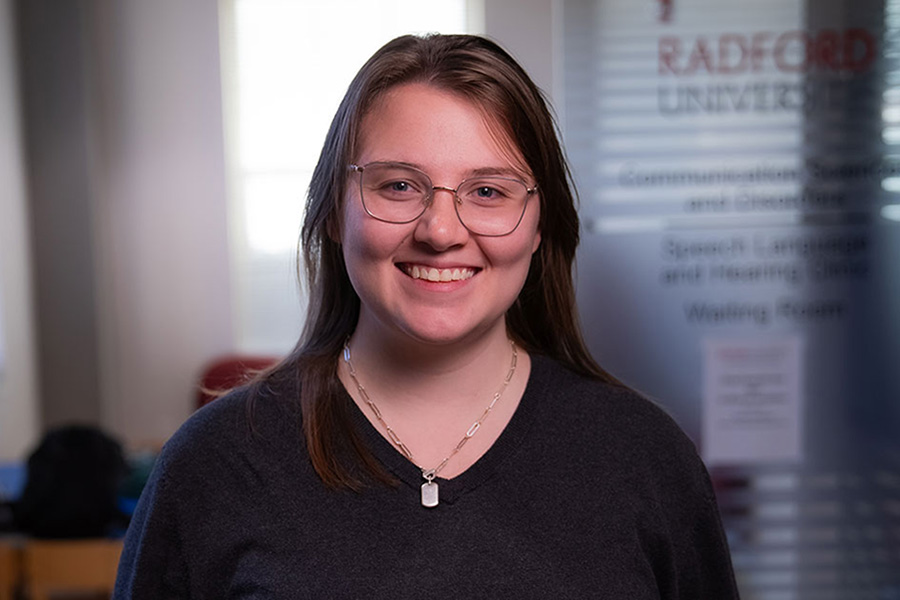Winter Commencement 2023: Grace Burke, Waldron College of Health and Human Services
by Mark Lambert
December 01, 2023

In high school, Grace Burke spent many hours immersed in theater and the arts, which she said taught her how to better communicate her thoughts and feelings — a distinct advantage over many of her peers that endured the COVID pandemic. Those hours, Burke said, paid off by giving her insight into what she wanted to do with her professional life.
“I wanted to help other people learn how to communicate,” Burke said, “so I was drawn to the majors that could help me do that.”
When she began considering colleges and universities with programs that could help her achieve that goal, Radford University became the natural choice. First and foremost, Radford offered a robust Communication Sciences and Disorders (COSD) program that provided hands-on experiences and clinical opportunities.
For Burke, though, the selling point was the smaller, tight-knit community that Radford offered her.
“I became a student at Radford because I knew I wanted to go to a smaller school where I could build meaningful relationships with my peers and professors,” the Narrows, VA native said. “Additionally, I felt like Radford offered more resources and scholarships to students who come from low income and rural communities, which made college more accessible to me.”
The COSD program, which focuses on science, anatomy, physiology and development of communication and the differences and disorders that may affect communication, felt like a natural fit for Burke. She knew that she wanted to become a speech therapist, but said the COSD program was much more in depth than she expected.
“I wasn't aware of how much speech therapist did, and I wasn't aware of how difficult this major would be,” Burke recalled. “However, I certainly don’t regret my decision. I believe I have become a better student and person through the hard work I have produced, which will help me be a good clinician.”
Burke also credit her success as a student — which will lead to the acceptance of her diploma as an Honors Student at the Winter Commencement Ceremony on Dec. 9 — to the support of the faculty in her program at Radford.
“They always saw more in me than I did in myself and helped to provide me with life changing experiences,” she said.
Burke’s hard work has recently been recognized on a much larger scale. In November, she presented her research at the American Speech-Language-Hearing Association (ASHA) Convention in Boston as part of the PROmoting the next GENeration of Researchers (PROGENY) program for undergraduate researchers. The purpose of PROGENY is to encourage the development of young scientists in communication sciences and disorders (CSD) and to highlight undergraduate research efforts.
“My research focused on implicit bias and its effect on clinical decision making” Burke said. “I want a career in research, so it was helpful for me to connect with other speech therapists who are doing research of their own.”
Burke said that the experience of sharing the results of her research was a very powerful moment for her. She said it sparked discussion, with people asking questions and sharing their own life experiences.
“I felt like I was making a difference. It challenged me as a student and a person and I was grateful to have been given the opportunity to grow and interact with other members of my profession,” she said.
Burke has paired her COSD degree with a minor in art at Radford and was able to explore that side of her education internationally last summer when she spent five weeks in in Verona, Italy as part of a study abroad.
“I feel that there is often a separation between art and science,” Burke said. “It is my opinion that in some spaces, one is valued over the other. However, I don’t want to be just one thing. I like to think of the good that could be done if there were more spaces that combined both art and science.”
Burke said that her goal is to combine the two to be a more well-rounded individual and clinician. She plans to continue working on her artistic endeavors in her free time so she can eventually incorporate art into her sessions when she works as a speech therapist.
After graduation, Burke plans to attend graduate school and obtain her master’s degree, followed by time working as a speech pathologist. Ultimately, she says she would like to earn her doctorate.
For students following in her footsteps, Burke says, “It may sound cliché, but I would tell them not to give up. There are definitely going to be some challenging moments — every student goes through it. However, all the faculty are extremely helpful and encouraging and you can lean on them and your peers for support.”
Burke also encourages her fellow students to make connections.
“My connections with my peers and faculty members have not only made things easier, but more fun as well,” she said. “I've met some of my very best friends in my program and I’m extremely grateful for my experience. I wouldn’t change a thing about my time at Radford.”